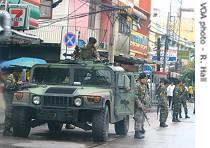2007年VOA标准英语-Thailand's Coup Stalls Southeast Asia's Democra(在线收听)
Bangkok
15 February 2007
Democratic gains in Southeast Asia came to a halt last year, experts say, largely due to Thailand's September coup. As Ron Corben reports from Bangkok, regional analysts say there is more to democracy than elections - but elections are still vital.
 |
| Soldiers on the streets of Bangkok following the coup |
Carl Thayer, political science professor at the University of New South Wales, says that even before the Thai coup, 2006 saw few democratic developments in the region. Communist governments still rule Laos and Vietnam, Burma's generals remain in charge after 40 years, and Cambodia has effectively become a one-party state.
"If we look at 2006 and made an assessment, we have to say there was no major progress in the region because of the setback in Thailand and a slow process everywhere," he said. "No change in Myanmar, no change in Brunei, Cambodia. Laos would also be in those sorts of categories."
Just a few years ago, there were rising expectations of greater democracy in the region.
Several Southeast Asian countries held successful elections and changed governments peacefully. That was a big change from the previous three decades, when strongman leaders dominated the region's governments - holding office for more than 20 years.
In 1998, Indonesians forced out President Suharto, who had led the country for 31 years, and now the country is a functioning democracy.
Malaysia's former deputy prime minister, Anwar Ibrahim, recently said he sees Indonesia as proof that democracy can succeed even as impoverished countries try to grow economically.
"We're now familiar with the dictum that democracy cannot precede economic development - without economic development there can be no democracy. That is to say that democracy can wait even if it means waiting forever," he said. "This of course is the logic of autocrats and dictators. And with the fall of Suharto, Indonesia's rapid emergence as a new democratic nation gives the lie to the excuse."
But some countries in Southeast Asia define democracy differently than do most Western nations. For instance, although Singapore and Malaysia hold elections, they have been dominated by a single party for four decades. Both countries restrict the media and activity by the political opposition.
Malaysia's Anwar Ibrahim, who hopes to run in his country's next elections, says genuine democracy requires several crucial elements that go beyond voting.
"We want governments to respect fundamental freedoms of all citizens including minorities and the marginalized," he said. "Government must be accountable to the people, decision making must be transparent, judiciaries must be independent, the press must be free and there must be rule of law."
Many people were alarmed by the military coup in Thailand, because of fears it could encourage other governments in the region to retreat from democracy. But some Thai advocates of democracy argue that Mr. Thaksin had used the ballot box to move the country toward a one-party system. They say he tried to quash criticism in the media and had managed to so dominate parliament that his policies faced little scrutiny.
Anand Panyarachun, a former Thai prime minister, says Mr. Thaksin used populist policies, such as aid to farmers, to build voting support. This enabled him to brush off criticism from democracy advocates.
"Thaksin was able to say 'If you don't like me why don't you play by the rules? Let's return power to the people and let's have an election,'" said Anand. "[But] the issues that were raised against him should not and could not be decided by a popular vote."
The government Thailand's military installed promises new elections by the end of this year, and Professor Thayer thinks after that, Thais will build a stronger democracy.
"Once elections are held and power devolves back to civilians I think we'll see the Thai middle class coming back with a vengeance to try to make up for the mistakes that would allow such a popularly elected prime minister to ruin the system - they will have learned from that," he said.
Eventually, Thayer says, all of Southeast Asia will become more democratic - and leaders will meet public demands for accountability and political progress.